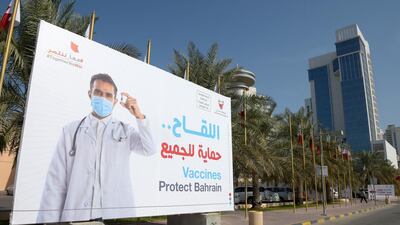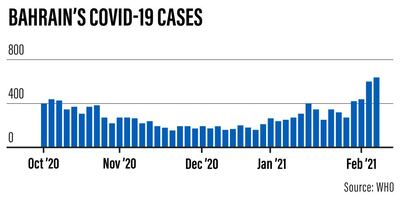With her elderly mother unable to walk long distances, Bahraini teacher Ghada was delighted when she heard a mobile service could bring the Covid-19 vaccine straight to her door.
Billed as a "world first", Bahrain began delivering and administering coronavirus vaccines at people's homes in January.
Ghada said her mother Roqaya, 78, was also in mourning after a death in the family, leaving her feeling unwell.
“After finding out about the mobile vaccination service, I just made a phone call to book an appointment for my mother and the medical team showed up to our house the very next day.”
The service has so far vaccinated more than 1,500 people free of charge.
"I had no trouble at all. It was a very smooth process," Roqaya told The National.
Bahrain's relatively small population and intensive vaccination strategy have made it one of the leaders in Covid-19 inoculation drives.
“We anticipated and planned for the arrival of a vaccine early during the pandemic, before any vaccine efficacy results or authorisation,” a Bahraini government spokesman said.
Despite efforts to curb the spread of the virus, case numbers in Bahrain increased among its 1.6 million population after infections waned towards the end of 2020.
Bahrain has recorded more than 104,000 Covid-19 cases and 376 deaths, with 657 cases recorded on Tuesday, the Ministry of Health reported.
On January 27, the National Medical Taskforce for Combating the Coronavirus announced tighter measures.
They included the complete suspension of classroom learning in schools and universities and indoor dining at cafes and restaurants for three weeks, urging the public to refrain from leaving their homes “unless necessary”.
In late January, Bahrain approved the UK's Oxford-AstraZeneca vaccine for emergency use, the third type being offered after those from Pfizer-BioNTech and China’s Sinopharm.
About 7,700 people in the Gulf state took part in Sinopharm's Phase 3 trials.
“This participation allowed us to adopt a phased approach to the vaccination roll-out and lay the foundations for rapid scale up,” the spokesman said.
Ghada said she chose Sinopharm's vaccine for her mother because some of her family members had taken part in the clinical trials.
The mobile vaccination unit will visit again to administer a second dose to her mother.
Bahrain has one of the highest testing rates per capita in the world, having conducted more than 2.6 million Covid-19 tests so far.
“Although the need for the mobile vaccination unit is limited as a percentage of the population, we have already seen the merits of mobile measures and had established systems and logistics that can be easily replicated,” the spokesman said.
“Some of the more vulnerable members of society can now be protected from the virus efficiently, safely and from the comfort of their own homes.”
The mobile units cater to the elderly, people with special needs and chronic illnesses, regardless of nationality, with the exception of visitors.



